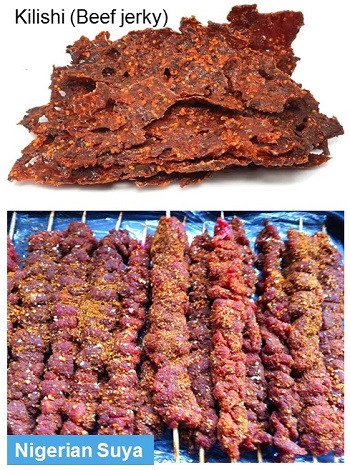By: Adebowale Bello, Freelance Health Writer with editorial contribution by The Datelinehealth Africa Team.
.jpg)
Cartoon image showing location of colon cancer
Colon cancer is steadily on the rise in Africa. A 2019 study focused on Africa revealed 1.9 million cases of colon cancer along with 940,000 deaths. This means that every 1 in 2 persons diagnosed with colon cancer succumbs to death (1).
Research has shown that your diet plays a huge role in improving overall well-being and this is especially evident in reducing your risk of colon cancer.
You need to make healthier dietary choices that improve your colon health and this blog discusses the best and worst African foods for colon cancer and some practical tips.
African foods that are rich in soluble and insoluble fiber. Click on image to enlarge.
Numerous studies have shown a positive link between fibre and a reduced risk of colon cancer (2). Fibre can be classified into soluble and insoluble fibre.
Foods rich in soluble fibre absorb water and form a gel-like substance during digestion. They also offer several health benefits such as preventing constipation, weight management and blood sugar regulation.
Some African foods rich in soluble fibre include okro (okra), yam, sweet potatoes, plantain, beans, groundnut and moringa leaves.
Insoluble fibre, just like the name implies, does not absorb water as it passes through the digestive tract. It helps your food move quickly through your stomach while maintaining healthy bowel habits.
Insoluble fibre can be found in African foods such as sorghum, millet, cowpea, cassava, cabbage and pumpkin leaves.
A combination of foods rich in soluble and insoluble fibres would greatly boost your immune health and significantly lower your risk of colon cancer and several other diseases.
Examples of some common fruits and vegetables found across Africa.
Click on image to enlage.
Fruits and vegetables are packed with essential nutrients, fibre and antioxidants, that play a crucial role in maintaining a healthy digestive system and preventing cancer.
Some fruits such as mango and pawpaw are high in fibre, add bulk to stool and move it smoothly along the digestive tract.
Fruits and veggies contain phytochemicals that prevent the growth of cancer cells and antioxidants which stop inflammation in the colon. They also ensure proper hydration thereby maintaining regular bowel movements.
Some common African fruits and vegetables are ugu (pumpkin), okro, garden egg, watermelon, cucumber and cabbage.
3. Legumes
Example of common African legumes. Click on image to enlarge.
Legumes are a popular food source in Africa and rightly so, as they contain protein, fibre, vitamins and flavonoids. These combination of nutrients inhibit the growth of colon cancer cells.
Some of these legumes are beans, cowpea, lentils and soybeans.
Africa has a wide variety of fermented foods, ranging from ogi, iru, ogiri, pito, garri and many more. These fermented foods contain live microorganisms which impact human health positively (3).
These microorganisms are known as probiotics and some of them include the Lactobacillus and Bifidobacterium species (3).
These stomach-friendly bacteria promote a good digestive environment, therefore balancing the gut microbiome. This prevents harmful bacteria from residing in the gut and further reduces the risk of colon cancer.
Popular African fish. Click on image to enlarge.
If you don't eat fish, you are definitely missing out on high-quality protein, essential fatty acids, and various vitamins and minerals that can improve your overall health.
Nutrients like omega-3 fatty acids, vitamin D and iodine make fish one of the best meals you can eat to improve your colon health.
Some common African fishes that you can find around you include catfish, tilapia, sardines and the barracuda.

Sugary drinks
Sugary beverages like soft drinks, energy drinks, and sweetened teas are packed with high amounts of sugar and offer little to no nutritional value.
The added sugar can lead to obesity and a rapid increase in blood sugar levels which create an environment where cancer cells can thrive.

Red meat such as beef, pork, mutton (sheep) and chevon (goat) contain compounds that can damage your colon cells, potentially leading to cancer. When you fry or grill meat, it produces harmful chemicals that increase cancer risk.
Processed, grilled and spiced meat such as Suya, Biltong, Kilishi and Kebabs are even more dangerous than cooked or fried red meat because they often contain nitrates and nitrites, chemicals that can turn into cancer-causing compounds in the body.

A sample of African alcoholic beers
Alcohol consumption is a significant risk factor for colon cancer. Drinking alcohol, even in moderate amounts, can increase your risk of developing this disease.
Alcohol causes chronic inflammation which is a known risk factor for several cancers and it can kill off the healthy bacteria in the digestive tract, thereby disrupting the balance and making the person prone to colon cancer.

A red bowl full of instant noodles with some scooped in a spoon
With the rise in consumption of ultra-processed foods, the risk of colorectal cancer keeps on rising. This is because such diets are low in essential nutrients that the body needs such as calcium, fibre and vitamins.
They are also extremely high in sugar, fats and unrefined starch which greatly increases an individual's chances of colorectal cancer (4).
Some ultra-processed foods include breakfast cereals, chips, instant noodles and biscuits.
Here are some tips that you can start implementing today to safeguard your colon health:
Thee simple changes described can make a big difference in reducing your risk of colon cancer. By making these changes to your diet and lifestyle, you’re not just reducing your risk of colon cancer, you're on the path to a healthier and happier life.
Click to watch and learn more from video asbout healthy eating and colon cancer prevention,
Credit: Siteman Cancer Centre. Washington University.School of Medivcine, St. Louis, Mo.
1. Awedew AF, Asefa Z, Belay WB. Burden and trend of colorectal cancer in 54 countries of Africa 2010–2019: a systematic examination for Global Burden of Disease. BMC Gastroenterol 22, 204 (2022). https://doi.org/10.1186/s12876-022-02275-0. Available from: https://bmcgastroenterol.biomedcentral.com/articles/10.1186/s12876-022-02275-0
2. Ryan-Harshman M, Aldoori W. Diet and colorectal cancer: Review of the evidence. Can Fam Physician. 2007 Nov;53(11):1913-20. Available from: https://www.ncbi.nlm.nih.gov/pmc/articles/PMC2231486/
3. Shi LH, Balakrishnan K, Thiagarajah K, Mohd Ismail NI, Yin OS. Beneficial Properties of Probiotics. Trop Life Sci Res. 2016 Aug;27(2):73-90. doi: 10.21315/tlsr2016.27.2.6. Available from: https://www.ncbi.nlm.nih.gov/pmc/articles/PMC5031164/
4. Wang L, Du M, Wang K, Khandpur N, Rossato S L, Drouin-Chartier J et al. Association of ultra-processed food consumption with colorectal cancer risk among men and women: results from three prospective US cohort studies. BMJ 2022; 378 :e068921 doi:10.1136/bmj-2021-068921. Available from: https://www.bmj.com/content/378/bmj-2021-068921
Related:
Eat African and Drop Your Colon Cancer Risk
Eating ‘Junk Food’ Can Raise Your Colon Cancer Risk
Colon Cancer: Symptoms, Causes, Risk factors, Diagnosis Treatment and Prevention
Published: May 29, 2024
© 2024. Datelinehealth Africa Inc. All rights reserved.
Permission is given to copy, use and share content for non-commercial purposes without alteration or modification and subject to source attribution.
DATELINEHEALTH AFRICA INC., is a digital publisher for informational and educational purposes and does not offer personal medical care and advice. If you have a medical problem needing routine or emergency attention, call your doctor or local emergency services immediately, or visit the nearest emergency room or the nearest hospital. You should consult your professional healthcare provider before starting any nutrition, diet, exercise, fitness, medical or wellness program mentioned or referenced in the DatelinehealthAfrica website. Click here for more disclaimer notice.